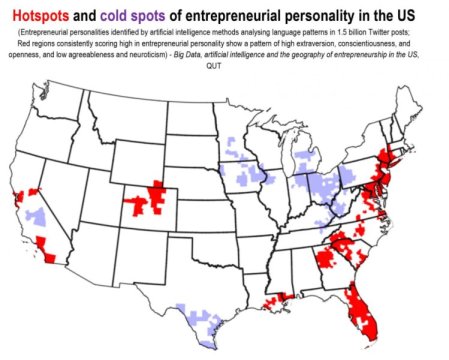[ad_1]
A world’s first QUT-led study has used artificial intelligence to analyse regional personality characteristics estimated solely from language patterns in 1.5 billion Twitter posts and uncover hotspots and cold spots of entrepreneurial personality and activity across the US.
QUT’s Associate Professor Martin Obschonka from the Australian Centre for Entrepreneurship Research teamed up with researchers from the London School of Economics and Political Science, the University of Pennsylvania and the University of Mannheim. Their paper, Big Data, artificial intelligence and the geography of entrepreneurship in the United States has just been published online via the Centre for Economic Policy Research (London, UK) and the Center for Open Science (Charlottesville, USA).
- Study analyses 1.5 billion Twitter tweets from the US across 1,772 counties (representing 95 per cent of the US mainland population) for differences in entrepreneurial personality, defined as a local patterns of high extraversion, conscientiousness, openness, and low agreeableness and neuroticism (an entrepreneurial constellation of the Big Five personality traits)
- The language of Twitter used in a region reveals information on the personality structure and economic vitality of the region’s population
- Large hotspots of entrepreneurial personality (larger areas consistently scoring high in entrepreneurial personality): Belt on the East Coast, spanning from Massachusetts all the way to Florida, Colorado around Denver / Boulder, San Francisco / Bay Area, and South California, Gulf Coast regions of Louisiana and Mississippi
- Large cold spots of entrepreneurial personality (larger areas consistently scoring low in entrepreneurial personality:): Rust Belt, Southern Texas, Central California
Professor Obschonka said the study proved a Twitter-based personality estimate is as successful in predicting local differences in actual entrepreneurial activity (e.g., local start-up rates) as regional personality data collected by means of millions of standard personality tests.
“What we have discovered here is that social media — how language is used in Twitter — is a reliable marker of economic vitality in a region,” Professor Obschonka said.
“We have examined Twitter data from a large project at the University of Pennsylvania. This project analysed 1.5 billion US tweets and other social media data to train a machine learning model that can estimate regional personality characteristics by analysing language patterns typically used on social media in a region.
“So far, studies examining regional differences in personality and meaningful effects on regional outcomes such as economic performance, well-being, health, or voting behaviour had to rely on costly and resource-consuming questionnaire studies that require millions of people to fill out long online personality tests.
“We wanted to test whether we find similar results, in our case effects of local personality on entrepreneurship, when using regional personality estimates generated by an artificial intelligence method, based on publicly available social media data such as tweets.
“The answer is yes. The US map of the Twitter-based local measure of entrepreneurial personality and the US map of the actual start-up rates show impressive overlap. We found substantial positive correlations between regional Twitter-based entrepreneurial personality and actual start-ups rates, and these correlations were robust when considering local economic conditions such as level of education, unemployment rate, and industry composition.
“More importantly, we find very similar or even higher correlations between regional differences in Twitter-based measures of entrepreneurial personality and entrepreneurial activity than in prior self-report studies analysing millions of personality tests.”
Professor Obschonka would now like to examine similar data in Australia, Europe and elsewhere.
“It seems that we stand at the dawn of a new era where we do not have to wait any longer until millions of people fill out long personality questionnaires to understand the local concentration of entrepreneurially-minded people, and local mechanisms such as entrepreneurship and innovation,” he said.
“Instead, by means of artificial intelligence methods we can simply analyse existing, publicly-available social media data such as billions of tweets to study local personality differences and their relevance for the well-being and prosperity of whole regions.”
Story Source:
Materials provided by Queensland University of Technology. Note: Content may be edited for style and length.
[ad_2]















